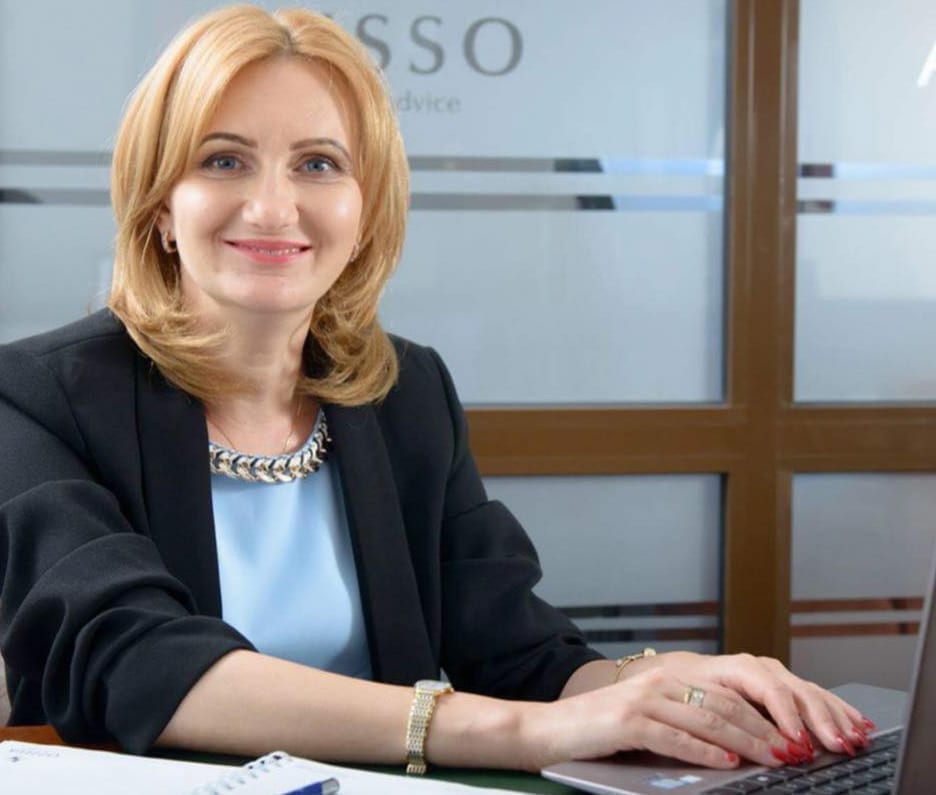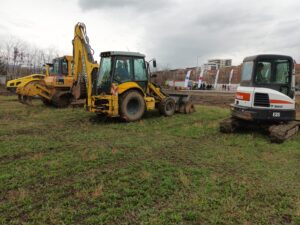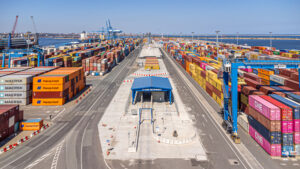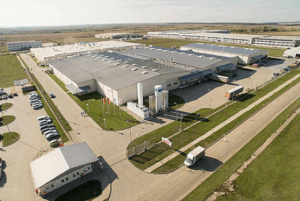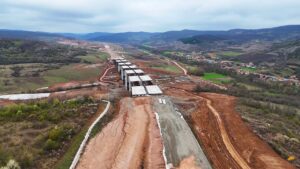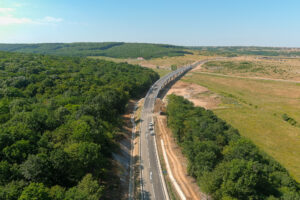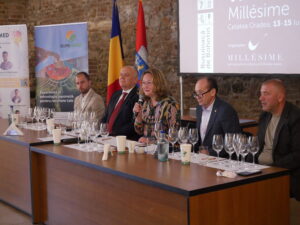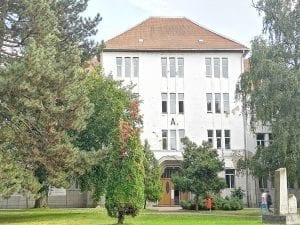Arda Ermut, President of the Investment Support and Promotion Agency of Turkey (ISPAT) and President of the World Association of Investment Promotion Agencies (WAIPA), talks in an exclusive interview for Transilvania Business – Romania, at MIPIM 2017, about global trends and advantages for Turkey and regional developments.
What makes Turkey attractive on the global stage?
When you look from a general perspective the track of foreign direct investments in Turkey is interesting: until 2002 the total volume was only around 1.5 billion US dollars, after 2002 to this day is around 12.5 to 18 billion US dollars/year. So there has been a huge and a dramatic change and if you look at the reasons for that, what was the dynamics behind, you can see that first of all Turkey’s fundamentals are interesting. We usually visualize this by drawing a circle around Istanbul, and in this circle there is this 4 hours flight zone reach, and in this circle there is a population of 1.6 billion people and with a total GDP of 27-30 trillion US dollars, so we are talking about a huge market, in the very close reach of Turkey, and usually the multinationals that are coming, are not coming only for Turkey, but they are coming to address this interesting potential markets. Another reason is of course demographics: Turkey’s average age is around 30 years old, and we are talking about 78 million population, maybe when compared to China is not a big one, but when compared to Europe is an important population, and also the neighboring markets around Turkey have also young population, maybe not Europe, but the Middle East, CIS countries, there are young and interesting populations so this is why these fundamentals are strong in Turkey. But fundamentals existed before in Turkey too, so what’s changed in the last 15 years? Of course the magic word is political stability, until 2002 the average age of a government was only 15 months but after 2002 there have been successive party governments so thanks to that they had the opportunity to make some long term reforms. Some of them made some structural changes in the economy to improve the investment environment also so this is why it affected also the medium foreign companies started to be aware of Turkey, they see more and more an investment friendly environment. Of course we have still steps to take, we have to improve – reduce bureaucracy, make some changes especially on the legal structure, to make some public reforms, but at the end there has been an important change and investors are starting to take advantage of it.
What is the impact/role of real estate projects?
Real estate is an interesting part, especially in this 18 billion US dollars that came after 2002 each year, we can say that nearly 3,7 billion US dollars are in real estate sector and we believe that the potential is still much higher because in the real estate sector there are some dynamics that keep the sector alive: first of all when you look at the average on the global scale the share of the construction activities in the total GDP is normally at an average of 11-12 %, but in Turkey this number is only 8-9 % so there still room for improvement; secondly, especially for Istanbul, just for Istanbul, 7 million units of housing have to be renewed because of this earthquake risk, the city is in an earthquake zone, and you have to renew this housing areas, and we are talking about the very center of Istanbul not some satellite at the outskirts of the city, but at the very center of it. This means that in the very premium locations there will be many real estate projects that will be done, that means that there are numerous opportunities for real estate investors from out of Turkey or inside Turkey. So there is no risk of something like a bubble or a problem for Turkey, there is a real demand, there is a huge growing economy, and too met this demand and increasing life standards, these real estate projects have to be completed and there is why there is a future and a growth potential for the real estate market, both in value and in regard to volume, this is why I think that the foreign investors can play also an important role for this upcoming projects in the real estate sector. And real estate sector has some indirect role for the perception of the country because at the end having this projects done in Turkey and making people living here, buying from this projects, actually is a very good proof for the living standards, for the livable conditions, because we had some major terror attacks unfortunately hit Turkey in the last two years and we had some concerns, and I am sure that for the people, especially those who haven’t been in Turkey, there is a perception gap and this people think that Turkey is like just other Middle East capital like Bagdad or Kabul, and maybe there is high risks on life issues or some security concerns, but actually when you come to Turkey you see that normal life is going on, there are lots of expats living in Turkey, there is no problem for security issues or living standards or accessibility to anything, any goods, any services, so, maybe in order to fill this gap of perception real estate investments can play an important role. These real estate developers must act globally, spending much on marketing, in order to market the individual projects they have to market the country also, this is why I think this is also a good way to promote Turkey as a touristic destination but in the same time as an investment destination. FDI inflow has an important role in Turkish economy and real estate will have a more and more important role I think.
How about Brexit and possible scenarios, how it will affect Istanbul & Turkey?
It is a very interesting issue for us because conventionally the number one export market and foreign trade partner for us is EU, and when you look at the country based, Germany is the biggest investor in Turkey, but second is the UK, so Europe and Great Britain are very important for us. The political situations in this two regions will be affecting us too, but, in regard to custom union issue we have a customs union with EU, having UK out of it will be an issue for us, but thanks to this ongoing discussion between the US and Europe about Trans Atlantic Trade and Investment Partnership (TTIP) we already start preparation to have one to one discussion with all member countries because it was our alternative to do that at that time, so if the EU start to use this statute, and if this trend goes on even if UK is existing or also someone else, we also have the opportunity to make our own individual deals with a EU member country to continue our relationship with Europe, because we have already have some free trade agreements, and out of Europe with around 47 countries, in discussion or already active, so we can continue this trend and make deals with other countries. Does London loses its attractiveness because of that? Maybe it will be affected a little bit, but I am sure that London will continue to be a very important financial and business center, but especially Istanbul will seem to be rising as also financial center and not maybe at the expense of London or Dubai but together with them, and thanks to that maybe. For example now Coca Cola is managing 94 countries from Istanbul, and Microsoft is managing 80 countries from Istanbul, Intel is managing 60 countries from Istanbul. The difference of Istanbul is more accessible than for example London with regards in visa issues especially for developing economies. This is also why I am chairing WAIPA – totaling 130 countries represented by 170 different investment promotion agencies, either national or local, and for example the headquarter of WAIPA was in Geneva for more than 15 years but we relocate it to Istanbul with a unanimous vote of the members, is an important decision, but it shows that Istanbul is much more accessible, much more affordable, and also in regard to central locations is easy to come. So is more accessible than London and is more central and more hybrid and internationalized than Dubai for example. We have some advantages maybe also the role of expats, we can offer some alternative as a regional center too, this is why now many multinationals are coming to Istanbul as to put it as their regional headquarter. So maybe out of all this ongoing dynamics I think Istanbul and Turkey will continue to rise as a regional hub.
MIPIM 2017 to showcase the investment opportunities in Turkey
Turkey continues to be front and center in the minds of many international investors thanks to the projects that have been realized in recent years and those that are on the agenda. Istanbul’s 3rd Airport and Airport City, which is to be established around it, as well as the Eurasia Tunnel, the Marmaray, and the 3-storey Grand Istanbul Tunnel projects, which connect two continents under the sea, are just some of those projects. At the same time in Turkey, which is passing through a great urban transformation, districts such as Beyoğlu have entered into a great period of investment and gentrification, while many other provinces including Antalya, Balıkesir, Hatay, and Kocaeli, are also benefiting from revitalization.
An interview by Ionut OPREA
Citește și:
Măsurile fiscale anunțate de Guvern vor sufoca IMM-urile. FICSIMM cere protecție pentru coloana vertebrală a economiei
Organizația Femeilor Antreprenor (OFA) trage un semnal de alarmă în legătură cu noile măsuri fiscal-bugetare propuse de Guvern,…
3 iulie 2025
Tramvaie dotate cu sisteme ce reduc riscurile de coliziune, la Oradea
Oradea a primit deja primul tramvai echipat cu sistemul de ultimă generație care avertizează coliziunea frontală. Tram Forward…
3 iulie 2025
Reșițenii cu tunurile pe Guvern: când se redeschide Arsenal Reșița?
Încă din prima zi de campanie electorală pentru alegerile prezidențiale, jurnaliștii din Banat au sărit cu tunurile pe…
3 iulie 2025
Femeia Belle Époque: Frumusețe și Eleganță
Muzeul Național al Banatului găzduiește la Bastion o expoziție extrem de interesată, denumită generic „Femeia Belle Époque: Frumusețe…
3 iulie 2025
Clujul scoate de la buget 16 milioane € pentru noul spital de copii
Banii din rectificarea bugetului propriu al instituției județene vor fi alocați de pentru continuarea alertă a lucrărilor la…
2 iulie 2025
Parcurile PSI din Bihor, deschise pentru business: licitații în Aleșd, Beiuș, Ștei și Marghita
Consiliul Județean Bihor a aprobat în ședința ordinară de luni, 30 iunie 2025, procedura de concesionare prin licitație…
2 iulie 2025
Bătaie mare pe “pașapoartele” Google la Cluj
Sute de studenți ai Universității Tehnice (UTCN) se luptă să prindă un loc în programul de securitate cibernetică…
2 iulie 2025
Mare târg în Maramureș. Produs de România, la prima descindere
Timp de trei zile, expoziția își propune să aducă împreună zeci de producători, artizani și vizitatori într-un spațiu…
2 iulie 2025
Investiții
La Oradea începe contrucția pasajelor supraterane la ieșirile spre Cluj și Satu Mare
Mircea Mălan, președintele Consiliului Județean Bihor, a semnat contractele pentru execuția a două pasaje rutiere supraterane, la ieșirea…
3 iulie 2025
Reșițenii cu tunurile pe Guvern: când se redeschide Arsenal Reșița?
Încă din prima zi de campanie electorală pentru alegerile prezidențiale, jurnaliștii din Banat au sărit cu tunurile pe…
3 iulie 2025
DP World lansează în România primul scanner tip drive-through din CEE
Scannerul îmbunătățește securitatea și eficiența activității comerciale în România, iar, în plus, oferă predictibilitate business-urilor pe lanțurile de…
3 iulie 2025
Parcurile PSI din Bihor, deschise pentru business: licitații în Aleșd, Beiuș, Ștei și Marghita
Consiliul Județean Bihor a aprobat în ședința ordinară de luni, 30 iunie 2025, procedura de concesionare prin licitație…
2 iulie 2025
Aquaparkul Nymphaea investește 4,08 milioane lei pentru atragerea vizitatorilor
Un bazin de înot, un tun cu spumă cu efect de jet, destinat activităților recreative, o mașină de…
1 iulie 2025
Afaceri de peste 9 miliarde de lei, derulate de primele 10 companii din Satu Mare
La 9.181,25 milioane de lei se ridică cifra de afaceri cumulată a primelor zece firme din județul Satu…
30 iunie 2025
Edilul Kölnului: “Clujul devine un hub economic vibrant în IT și tech”
Dr. Ralf Heinen, “primarul cu papion”, ne-a explicat, într-un interviu în exclusivitate mijlocit de Clubul Oamenilor de Afaceri…
30 iunie 2025
Business sustenabil: Cum reduce Lava Knitting costurile cu 50% fără să scadă producția
Într-o industrie în care eficiența este adesea privită ca o simplă reducere de costuri, Lucian Fetea, directorul general…
30 iunie 2025
Infrastructură
La Oradea începe contrucția pasajelor supraterane la ieșirile spre Cluj și Satu Mare
Mircea Mălan, președintele Consiliului Județean Bihor, a semnat contractele pentru execuția a două pasaje rutiere supraterane, la ieșirea…
3 iulie 2025
Parcurile PSI din Bihor, deschise pentru business: licitații în Aleșd, Beiuș, Ștei și Marghita
Consiliul Județean Bihor a aprobat în ședința ordinară de luni, 30 iunie 2025, procedura de concesionare prin licitație…
2 iulie 2025
Dealurile Transilvaniei, sperietoarea “drumarilor”
Alunecările de teren sunt cel mai des invocate de administrație pentru întârzierile de 10-15 ani în concretizarea autostrăzilor,…
1 iulie 2025
Hidronic, povestea unei companii din Cluj-Napoca care mișcă apa și transformă comunitățile.
Hidronic a început cu ambiția de a construi local ceea ce alții aduceau din afară. Astăzi, compania este…
27 iunie 2025
Incursiune în istoria Inteligenței Artificiale
„Aducem 𝐈𝐧𝐭𝐞𝐥𝐢𝐠𝐞𝐧𝐭̗𝐚 𝐀𝐫𝐭𝐢𝐟𝐢𝐜𝐢𝐚𝐥𝐚̆ mai aproape, în Regiunea Vest” a fost sloganul impus de ADR Vest, aceștia reușind ca…
26 iunie 2025
Se deschide complet Inelul Rutier Metropolitan Oradea – a doua centură a Oradiei
Cei care călătoresc dinspre Arad spre Cluj Napoca nu vor mai trebui să treacă pe Centura Oradiei. La…
25 iunie 2025
O asociere condusă de Global Industrial va executa pasajul subteran Oneștilor din Oradea
Asocierea formată din Global Industrial (lider), CML.RO și DP Proiect va avea la dispoziție 15 luni pentru finalizarea…
24 iunie 2025
Antreprenorul DPB consolidează în timp record DN 68A
Compania Drumuri și Poduri Banat a finalizat, înainte de termen, lucrările la DN 68A Coșava – Margina, unul…
24 iunie 2025
Turism
Parc botanic cât un cartier lângă Băile Figa. Proiecte de 70 mil. € la Beclean
Grădina Urbană Transilvania (GUT) și parcul de specializare inteligentă se numără printre marile investiții programate în orașul din…
1 iulie 2025
„Festivalul Părădăicilor” de la Macea: gust autentic și tradiție locală
Evenimentul ajuns la a XV-a ediție devine un model de dezvoltare rurală prin promovarea produselor locale, implicarea comunității…
1 iulie 2025
Aquaparkul Nymphaea investește 4,08 milioane lei pentru atragerea vizitatorilor
Un bazin de înot, un tun cu spumă cu efect de jet, destinat activităților recreative, o mașină de…
1 iulie 2025
Comisia Europeană a făcut team building pe Via Transilvanica
Vicepreședintele instituției, Roxana Mînzatu, a participat, în județul Bistrița-Năsăud, la o dezbatere despre mediul rural și a inaugurat…
30 iunie 2025
Fostul ministru MIPE, Marcel Boloș, s-a întors director general la ADR Nord – Vest
Marcel Boloș, fostul ministru al Investițiilor și Proiectelor Europene (MIPE) s-a întors, cu gânduri mari, pe poziția de…
27 iunie 2025
Se deschide complet Inelul Rutier Metropolitan Oradea – a doua centură a Oradiei
Cei care călătoresc dinspre Arad spre Cluj Napoca nu vor mai trebui să treacă pe Centura Oradiei. La…
25 iunie 2025
Peste 300 de vinuri de top, de la 24 de crame, la Salonul Vinurilor Millésime
Salonul Vinurilor Millésime și-a consumat cea de-a VII-a ediție, în weekendul 13 – 15 iunie 2025 în Cetatea…
23 iunie 2025
Gala Aniversară Transilvania Business 15 ani
Gala Aniversară Transilvania Business a marcat 15 ani de la apariția primei ediții a publicației economice. Evenimentul găzduit…
20 iunie 2025
Educație
Rețeaua, valoarea în business și cinnamon rolls, într-un eveniment marca Sibiu IT Cluster
Într-un mediu economic aflat în continuă transformare, succesul unei afaceri nu mai poate fi separat de formarea profesională…
2 iulie 2025
Clujul scoate de la buget 16 milioane € pentru noul spital de copii
Banii din rectificarea bugetului propriu al instituției județene vor fi alocați de pentru continuarea alertă a lucrărilor la…
2 iulie 2025
Cărturești propune pentru RIVUS Cluj-Napoca cea mai mare librărie și cel mai nou concept edutainment din România
O mare varietate de cărți și produse de papetărie, cafenea și spații de joacă, ateliere creative și educaționale,…
1 iulie 2025
Începe admiterea la Universitatea din Oradea. În premieră, Învățământ dual
Universitatea din Oradea are alocate 2.020 de locuri bugetate pentru sesiunea de admitere 2025. Odată cu luna iulie…
1 iulie 2025
Alba va avea un campus de învățământ profesional de 20 milioane €
Universitatea Tehnică din Cluj-Napoca va oferi programe de inginerie mecanică și economică industrială, dar și de tehnologia construcțiilor…
30 iunie 2025
Ovidiu Oltean învață antreprenorii cum să scape de frica vorbitului în public
Un eveniment marca Connect Timișoara, parte a Bizz.Club, care are obiectiv atât realizarea unui serios networking între antreprenorii…
29 iunie 2025
Fără cozi, fără hârtii: AJOFM Bihor mută serviciile în online
Agenția Județeană pentru Ocuparea Forței de Muncă (AJOFM) Bihor anunță implementarea la nivel local a Platformei PULS, un…
29 iunie 2025
Vicepreședintele Comisiei Europene a ajuns la Cluj
Roxana Mînzatu a analizat, la sediul celei mai mari universități din România, noul proiect european „Union of Skills”.…
28 iunie 2025



